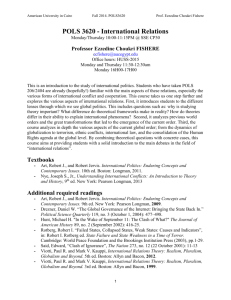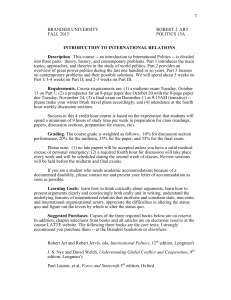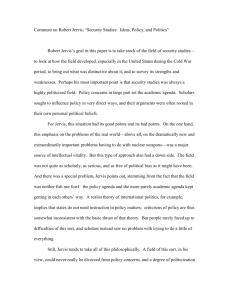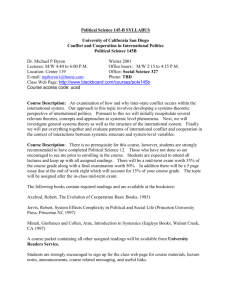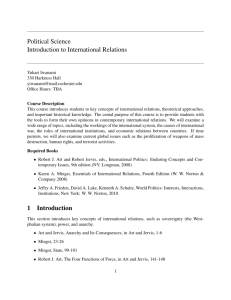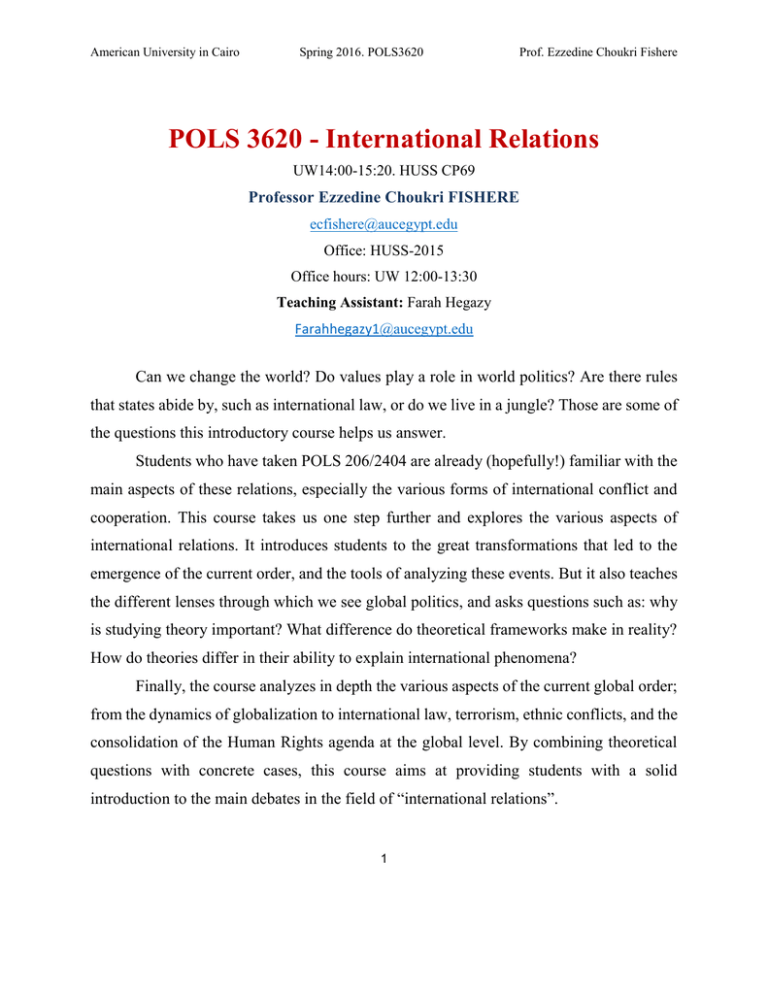
American University in Cairo
Spring 2016. POLS3620
Prof. Ezzedine Choukri Fishere
POLS 3620 - International Relations
UW14:00-15:20. HUSS CP69
Professor Ezzedine Choukri FISHERE
ecfishere@aucegypt.edu
Office: HUSS-2015
Office hours: UW 12:00-13:30
Teaching Assistant: Farah Hegazy
Farahhegazy1@aucegypt.edu
Can we change the world? Do values play a role in world politics? Are there rules
that states abide by, such as international law, or do we live in a jungle? Those are some of
the questions this introductory course helps us answer.
Students who have taken POLS 206/2404 are already (hopefully!) familiar with the
main aspects of these relations, especially the various forms of international conflict and
cooperation. This course takes us one step further and explores the various aspects of
international relations. It introduces students to the great transformations that led to the
emergence of the current order, and the tools of analyzing these events. But it also teaches
the different lenses through which we see global politics, and asks questions such as: why
is studying theory important? What difference do theoretical frameworks make in reality?
How do theories differ in their ability to explain international phenomena?
Finally, the course analyzes in depth the various aspects of the current global order;
from the dynamics of globalization to international law, terrorism, ethnic conflicts, and the
consolidation of the Human Rights agenda at the global level. By combining theoretical
questions with concrete cases, this course aims at providing students with a solid
introduction to the main debates in the field of “international relations”.
1
American University in Cairo
Fall 2014. POLS3620
Prof. Ezzedine Choukri Fishere
Textbooks
-
-
Art, Robert J., and Robert Jervis. International Politics: Enduring Concepts and
Contemporary Issues. Boston: Longman, 12th ed., 2015. (Available at Library’s Reserves)
Nye and Welch, Joseph S., Jr., Understanding International Conflicts: An Introduction to
Theory and History. New York: Pearson Longman, 9th ed., 2014. (Available at Library’s
Reserves)
Viotti, Paul R. and Mark V. Kauppi, International Relations Theory: Realism, Pluralism,
Globalism and Beyond. Boston: Allyn and Bacon, 2014. (Available at Library’s Reserves)
Additional required readings
-
-
Hugh Thirlway, “The Sources of International Law”, in: Evans, Malcolm D., International
Law, OUP Oxford. 2010. pp 91-117. (Available on Blackboard)
Hunt, Michael H. "In the Wake of February 11: The Clash of What?" The Journal of
American History 89, no. 2 (February 2002): 416-25. (Available on Blackboard)
Rotberg,Robert I. “Failed States, Collapsed States, Weak States: Causes and Indicators”,
in: Robert I. Rotberg ed. State Failure and State Weakness in a Time of Terror. Cambridge:
World Peace Foundation and the Brookings Institution Press (2003), pp.1-29. (Available
on Blackboard)
Said, Edward, “Clash of Ignorance”, The Nation 273, no. 12 (22 March 2001): 11-13.
(Available on Blackboard)
Grading
Grading scheme
A
AB+
B
BC+
C
CD+
D
F
Grade distribution
starting 90%
starting 88%
starting 85%
starting 80%
starting 78%
starting 75%
starting 70%
starting 68%
starting 65%
starting 60%
below 60%
Participation
Midterm I
Midterm II
Final Exam
Submissions
2
10%
30%
30%
30%
American University in Cairo
Spring 2016. POLS3620
Prof. Ezzedine Choukri Fishere
-
No late submission is accepted.
-
Work should be concise, reflect clarity of thinking, and follow a logical presentation.
-
All submissions are don’t via BlackBoard. No hard copies or email attachments are
acceptable.
-
Submissions should be typed in Times New Roman font, size 12, spaced in 1.5, 1-inch
margin each side, on regular A4 sheets.
Expectations
-
Students should arrive before class begins. Attendance will be taken at the beginning of
class. No entry is allowed 10 minutes after class begins. Those who arrive during these 10
minutes - and those who leave before class ends - lose a third of the attendance grade.
Students who are absent for more than six sessions, regardless of the reason, will receive
an F grade in the course.
-
Students are required to read the texts thoroughly before coming to class. Not reading
means a loss of the participation grade. Students will be quizzed on the readings.
-
Students’ participation refers mainly to reading the required texts before class. This is the
basis of the discussion taking place in class, and therefore constitutes an integral part of the
learning process. Students will be quizzed on the readings.
-
The AUC has a zero-tolerance policy regarding academic integrity.
-
Negotiation is a skill that students will not need in this course in any shape or form.
Students who feel that they are subject of unfairness are encouraged to complain directly
to the Political Science Department.
-
Students are expected to observe general rules of civility (turn off your mobile phone
before you come, listen to your colleagues and avoid interrupting them, don’t monopolize
the discussion, be considerate of others, etc.).
Communication
3
American University in Cairo
-
Fall 2014. POLS3620
Prof. Ezzedine Choukri Fishere
Questions regarding the readings’ availability, deadlines and other details related to the
course should be addressed to the teaching assistant.
-
All emails to the instructor should be copied to the teaching assistant.
Schedule
Week 1
Sunday 31 January
Introduction
Wednesday, 3 February
The Explanation of IR (a discussion)
- Nye and Welch, Joseph S., Jr., Understanding International Conflicts: An Introduction to
Theory and History. New York: Pearson Longman, 2014, pp. 7-22
Week 2
Sunday, 7 February
Tools of Analysis I
- Nye and Welch, 45-58
- Nye. J. “Hard and Soft Power in American Foreign Policy”, in: Viotti, Paul R. and Mark
V. Kauppi, International Relations Theory: Realism, Pluralism, Globalism and Beyond.
Boston: Allyn and Bacon, 2014. pp. 107-115
Wednesday, 10 February Tools of Analysis II
- Nye and Welch, 58-81
Week 3
Sunday, 14 February
Realism I
- Machiavelli, N., “On Princes and the Security of Their States”, in: Viotti and Kauppi, pp.
86-88
- Hobbes, T., “On the Natural Condition of Mankind”, in: Viotti and Kauppi, pp. 88-91
- Morgenthau, H., “Six Principles of Political Realism”, in: Art, Robert J., and Robert Jervis.
International Politics: Enduring Concepts and Contemporary Issues. Boston: Longman,
2015, pp. 29-34
Wednesday, 17 February Realism II: selected Readings
- Waltz, K., “The Anarchic Structure of World Politics”, in: Art and Jervis, pp. 47-65
- Walt, Stephen, “Alliances: Balancing and Bandwagoning”, in: Art and Jervis, pp. 124130
- Jervis, R., “Offense, Defense and the Security Dilemma”, in: Art and Jervis, pp. 93-111
Week 4
Sunday, 21 February
Pluralist Approaches I
4
American University in Cairo
Spring 2016. POLS3620
Prof. Ezzedine Choukri Fishere
- Viotti and Kauppi (2012): pp. 127-162
Wednesday, 24 February Pluralist Approaches II: Selected Readings
- Robert O. Keohane, “International Institutions: Can Interdependence Work?” in: Art and
Jervis, pp. 148-154
- Stephen Brook, “Producing Security”, in: Viotti and Kauppi, pp. 165-172
Week 5
Sunday, 28 February
Critical Theories I
- Viotti and Kauppi, pp.187-214
Wednesday, 2 March
Critical Theories II: Selected Readings
- Immanuel Wallerstein, “The Modern World System as a Capitalist World Economy” in:
Viotti and Kauppi, pp. 225-231
- Alexander Wendt, “Anarchy is what States Make of It”, in: Art and Jervis: pp. 73-80
Sunday 6 March Mid Term I (in class)
Week 6
Wednesday 9 March
Peloponnesian War
- Nye and Welch, 22-40
Sunday, 13 March
International conflicts: World War I
- Nye and Welch, 85-116
Week 7
Wednesday, 16 March
International conflicts: World War II
- Nye and Welch, 119-146
Sunday, 20 March International conflicts: The Cold War
- Nye and Welch, 149-198
Week 8
Wednesday, 23 March
Post-Cold War Issues
- Nye and Welch, 201-261
Sunday, 27 March
Official Holiday (Western Easter)
Week 9
Wednesday, 30 March Mid Term II (in class)
Sunday, 3 April
Globalization
- Jeffrey Frankel, “Globalization of the Economy”, in: Art and Jervis, pp.256-269
- Pankaj Ghemawat, “Why the World Isn’t Flat? ”, in: Art and Jervis, pp.270-274
- Moises Naim, “What Globalization Is and Is Not”, in: Art and Jervis, pp.275-279
Week 10
Wednesday, 6 April
The UN System
5
American University in Cairo
Fall 2014. POLS3620
Prof. Ezzedine Choukri Fishere
-
The UN Charter (available online: http://www.un.org/en/documents/charter/)
Adam Roberts, “The United Nations and International Security”, in: Art and Jervis, pp.
433-440
Sunday, 10 April
International Law
- Stanley Hoffmann, “The Uses and Limits of International Law”, in: Art and Jervis: pp.
144-147
- Hugh Thirlway, “The Sources of International Law”, in: Evans, Malcolm D.,
International Law, OUP Oxford. 2014. pp 91-117. (Available on Blackboard)
Week 11
Wednesday, 13 April
Human Rights
- Rhoda E. Howard and Jack Donnelly, “Human Rights and World Politics”, in: Art and
Jervis, pp. 376-386
Sunday, 17 April
Failed States
- Robert I. Rotberg, “Failed States, Collapsed States, Weak States: Causes and Indicators”,
in: Robert I. Rotberg ed. State Failure and State Weakness in a Time of Terror (2003),
pp.1-29.
Week 12
Wednesday, 20 April
Intervening in domestic conflicts?
- Koffi Annan, “Reflections on Intervention”, in: Art and Jervis, pp. 342-346
- Jon Western and Joshua Goldstein, “Humanitarian Intervention Comes of Age”, in: Art
and Jervis, pp. 347-352
- Alexander B. Downes, “To the Shores of Tripoli? Regime Change and Its
Consequences”, in: Art and Jervis, pp.360-366
- Caroline Hartzell and Mathew Hoddle, “Crafting Peace Through Power Sharing”, in: Art
and Jervis, pp.367- 375
Spring Break 24 April – 2 May
Wednesday, 4 May
Civilization and Identity
- Huntington, “The Clash of Civilizations”. (Available on Blackboard)
- Hunt, “In the Wake of February 11: The Clash of What?” (Available on Blackboard)
- Said, “Clash of Ignorance” (Available on Blackboard)
Week 13
Sunday, 8 May
Information revolution and World Politics
- Nye and Welch, 297-325
Wednesday, 11 May
Global Governance
- Garett Hardin, “The Tragedy of the Commons”, in: Art and Jervis, pp. 422-426
- David G. Victor, “International Cooperation on Climate Change: Numbers, Interests and
Institutions”, in: Art and Jervis, pp. 427-432
- Kenneth Walz, “Globalization and Governance”, in Art and Jervis, pp. 440-449
Week 14
6
American University in Cairo
Spring 2016. POLS3620
Prof. Ezzedine Choukri Fishere
Sunday, 15 May
The Relevance of Violence: States
- Robert J. Art, “The Four Functions of Force”, in: Art and Jervis: pp. 159-165
- Thomas Schelling, “The Diplomacy of Violence”, in: Art and Jervis, pp. 166-178
Wednesday, 18 May
The Relevance of Violence: Terrorism
- Bruce Hoffman, “What is Terrorism?” in: Art and Jervis, pp. 178-187
- Audrey Kurth Cronin, “Ending Terrorism”, in: Art and Jervis, pp. 327-332
- Barack H. Obama, “Dealing with the Current Terrorist Threat”, in: Art and Jervis, pp.
333-341
7

